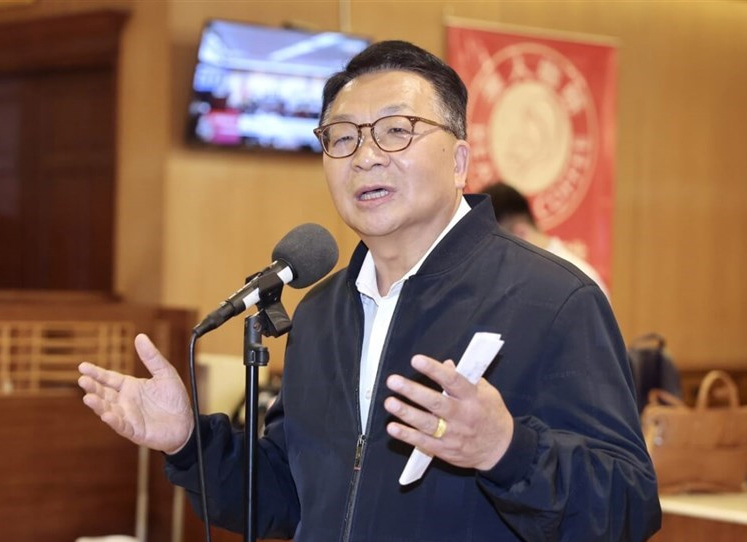Former Democratic Progressive Party (DPP) legislator Chen Ou-po (陳歐珀) is under investigation by the Taipei District Prosecutors Office for alleged corruption involving United Logistics International Co. (ULIC), a private logistics company based in Keelung. The case stems from suspected bribery and misuse of legislative influence during Chen’s term as a lawmaker between 2016 and 2020.
🧾 Background: How a Port Accident Triggered a Political Probe
The case traces its origin to a 2018 maritime accident in which a cargo vessel collided with shipping containers and equipment owned by ULIC at the Port of Keelung, resulting in substantial financial loss. At that time, Taiwan’s Commercial Port Law did not include private logistics companies under the scope of compensatory claims.
Facing regulatory inaction, ULIC reportedly turned to Chen Ou-po, who then allegedly used his office to push for legal amendments favoring private logistics firms. Investigators believe Chen held meetings, conducted legislative interpellations, and possibly lobbied for changes in port-related regulations to support ULIC’s interests.
⚖️ Suspected Violations Under the Anti-Corruption Act
According to the Taipei District Prosecutors Office, Chen may have accepted improper benefits or bribes in exchange for his advocacy. These actions could constitute a violation of Taiwan’s Anti-Corruption Act, which strictly prohibits public officials from leveraging their positions for personal or third-party gain.
To build their case, prosecutors coordinated with the Agency Against Corruption (AAC) to execute 14 raids on Tuesday at various sites connected to the allegations. These included:
- Chen’s private residence
- Offices and homes of associates
- ULIC’s corporate headquarters
Prosecutors also stated that ten individuals—including Chen himself, a legislative assistant, and several of his close contacts—are either under active investigation or have been summoned for questioning.
🕵️♂️ Legal and Political Implications
This case adds to a growing list of legal challenges faced by current and former Taiwanese legislators, raising concerns about corporate influence in politics. While Chen has not yet been formally charged, the raids and the seriousness of the allegations indicate that prosecutors are pursuing the case aggressively.
If found guilty, Chen could face severe penalties under the Anti-Corruption Act, including:
- Imprisonment
- Disqualification from holding public office
- Confiscation of illegal gains
This investigation also casts a shadow on the DPP’s broader image, particularly as it continues to position itself as a party committed to transparency and reform.
🔎 Original Insight: Corporate Lobbying in Taiwan’s Port Sector
This case highlights a critical blind spot in Taiwan’s port regulation laws—namely, the exclusion of private logistics firms from the Commercial Port Law’s compensation clauses. While such gaps in regulation often result in civil claims or lobbying efforts, this case is unusual for escalating into a criminal bribery probe.
Experts believe that the logistics and shipping industry, which plays a strategic economic role in Taiwan, may increasingly become a hotbed for lobbying, especially as international port competition intensifies and cross-strait tensions affect trade flows.
🛡️ DPP’s Position: Silence or Solidarity?
As of now, the DPP has not issued a formal statement regarding Chen’s investigation. Political analysts suggest that the party is likely to distance itself from the case, as Chen has not held office since 2020, and maintaining a stance of legal neutrality may help mitigate any reputational damage.
🔍 FAQs
Who is Chen Ou-po?
Chen is a former lawmaker from the Democratic Progressive Party (DPP), serving in the national legislature from 2012 to 2020.
What is he accused of?
Chen is under investigation for allegedly accepting bribes from ULIC to push favorable legal changes during his term in office.
What triggered the investigation?
A 2018 accident at the Port of Keelung involving ULIC prompted the firm to seek Chen’s legislative support, which may have involved improper benefits.
How many people are involved?
At least 10 people, including Chen, his assistant, and several associates, are currently being investigated.
What are the consequences if found guilty?
Chen could face criminal charges under Taiwan’s Anti-Corruption Act, including jail time and a permanent ban from political office.


